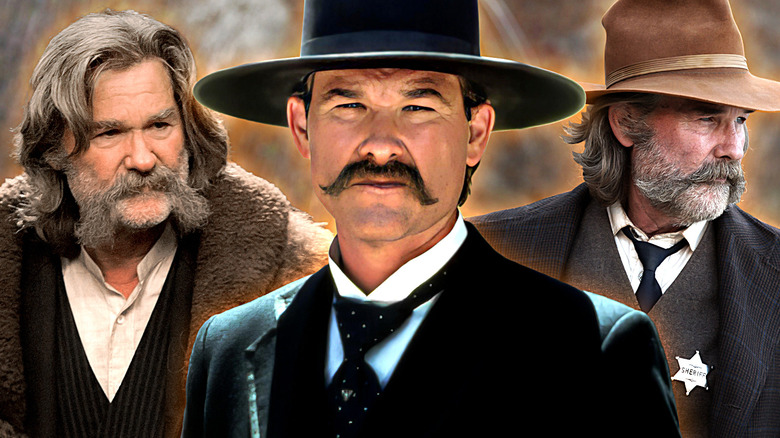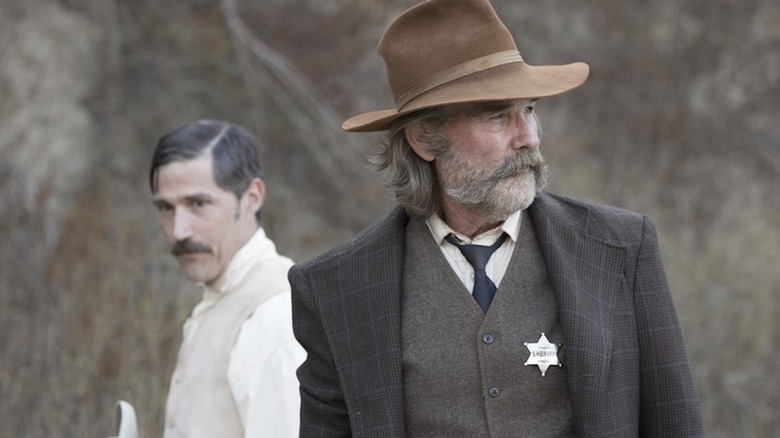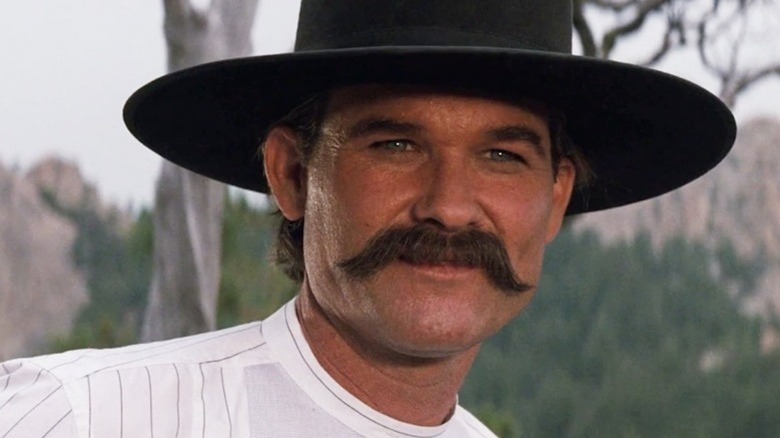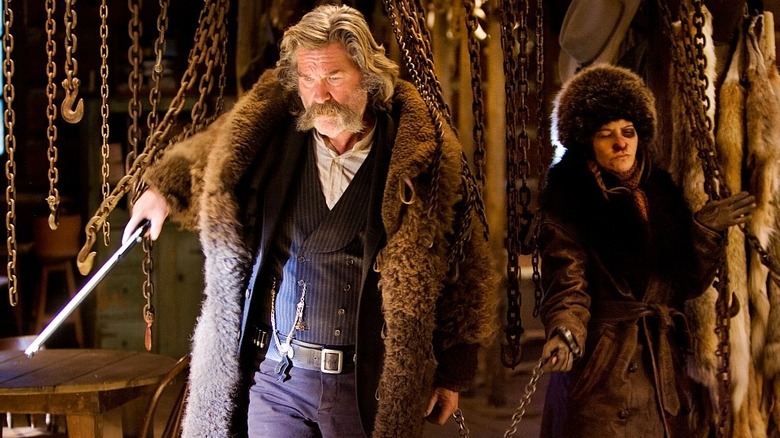Kurt Russell's Western Movies, Ranked
Hollywood, like the rest of the world, wasn't feeling so hot about the United States in the 1970s. Faced with the relentless cruelty of the Vietnam War and the overt racism of President Richard M. Nixon's "law and order" dictates (plus his wanton abuse of power via the cover-up of the Watergate scandal), the most excitingly talented filmmakers of that era offered up "The Godfather," "Serpico," and "Nashville." Even a rollicking mainstream comedy like "The Bad News Bears" carried an anti-establishment charge.
All of this was juxtaposed against the realization that John Wayne was dying. The quintessential American movie star who, alongside his frequent collaborator John Ford, transformed the Western into manifest-destiny mythmaking, was grasping for relevance in hoary oaters and toothless cop flicks while losing his second battle with cancer. Moviegoers were alternately hostile to and unsettled by this; the man they either dearly wanted or steadfastly did not want to be was out of fashion. Recognizably flawed human beings were all the rage, and Wayne simply couldn't abide being anything other than the death's doorstep version of what he'd always been (as he was in his final film, Don Siegel's "The Shootist"). Once he was gone, his type and the genre he popularized would seemingly go with him.
This left a leading man like Kurt Russell in a predicament. The one-time Disney child star had grown up to be a charmingly handsome devil. Had the Western still been en vogue, Russell's transition to adult stardom would've been remarkably smooth. Athletic, sexy, and self-deprecating, he was the genre's next man up; alas, the genre up and died for a bit, right as he was entering his early prime.
We shed no tears for Russell, though. John Carpenter's "Elvis" proved he could act, while "Escape from New York" established his badass bona fides. He also got to take the piss out of Wayne's hyper-capable tough guy act in Carpenter's "Big Trouble in Little China."
Yet, Russell didn't get to make a Western full-stop until he saddled up as Wyatt Earp in 1993's "Tombstone." Unsurprisingly, he was a natural in the legendary lawman role, but it would be another 12 years before he got down and dusty again. To date, he's only made three official Westerns. If this doesn't feel like enough, you can at least say his efforts provoke strong reactions from audiences — good or bad. With this in mind, let's rank 'em!
3. Bone Tomahawk
S. Craig Zahler's first attempt at genre deconstruction is easily his best-written work. Had he handed it over to an above-average director with a sharp sense of pacing, this could've been the "Predator in the Old West" flick we never knew we wanted.
Unfortunately, first-timer Zahler took the reins, turning in an authentic-looking Western that's sluggish, awkwardly staged, and downright clumsy in its transposing of Ford's "The Searchers" to a horror film. What doesn't work about "Bone Tomahawk" isn't Russell's fault. He's commanding when he needs to be a sheriff who leads a four-man posse out into the wild to rescue a young woman who's been kidnapped by a mutant species called the "troglodytes." If you're looking for the kind of uneasy commentary on Ford's masterpiece, you'll find only a vaguely racist othering by a writer whose work went full meathead one film later with "Brawl in Cell Block 99." Your mileage will most likely vary because I'm very much in the minority in disliking this film, but I can only view it as a fiercely disappointing missed opportunity. Kurt deserved better.
2. Tombstone
There are loads of better Westerns than "Tombstone," but not many are as wildly entertaining. The Kevin Jarre-scripted biographical drama purports to be a semi-factual retelling of the Wyatt Earp legend, but somewhere between Jarre's removal from the director's chair and George Pan Cosmatos' installation, it turned into a rollicking shoot-'em-up further boasting flavorful performances from Russell, Sam Elliot, Powers Booth, Michael Biehn and, of course, Val Kilmer as the gunslinging dentist Doc Holliday. As was the case with the grossly inferior "Bone Tomahawk," Russell is this film's glue guy; he gets a couple of memorable lines and his share of big moments, but mostly he lets his supporting cast steal scenes with impunity. It's a generous film in this regard, and the manly good vibes wash over its myriad fans, many of whom can quote it chapter and verse.
Aside from his John Wayne parody in "Big Trouble in Little China," this is the only film where you get to see Russell really swagger in that Duke fashion. It's not a challenging role, but it sure looks like it's a pleasurable one –- which is significant given the aforementioned behind-the-scenes turmoil. You're watching a man savor his role as the film's savior, so you can't begrudge him this one Duke-ified indulgence.
1. The Hateful Eight
Quentin Tarantino's only official Western ("Django Unchained" used the genre's tropes, but was set largely in the American South) cast Russell as John "The Hangman" Ruth, a bounty hunter who's transporting "Crazy" Daisy Domergue (Jennifer Jason Leigh) through Wyoming to Red Rock for a neck stretching. He gets snowed in at a haberdashery with a colorful array of scoundrels, and projects possibly the biggest presence of everyone in the room, although one very big, quite undermining surprise awaits Ruth.
Tarantino's film could easily be done as a stage play, though its length may feel as challenging in a live theater format as it does in movie form. The best version of "The Hateful Eight" to watch is probably the 210-minute miniseries cut currently on Netflix. While I wouldn't say the film necessarily needed to breathe more, there is a fun, quasi-cliffhanger element in this variation. But if you're watching strictly for Russell, both cuts showcase a throwback star playing a battered bastard who hides behind the righteousness of the law to beat the tar out of a woman. It's nasty stuff, and awfully fascinating when you take into account Russell's wholly unveiled Wayne impersonation. It's the Duke's legend rewritten as blood-spitting fact.



